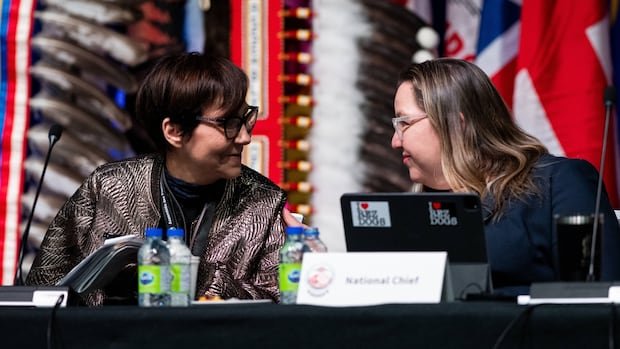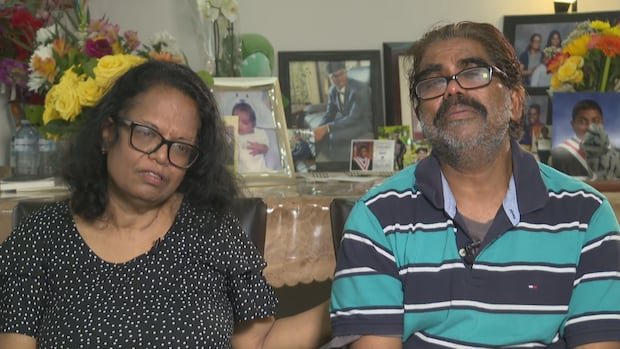The chief of the Assembly of First Nations has written a “concerned” letter to children’s advocate Cindy Blackstock, amid uncertainty over the future of long-term reform of the child welfare system on reserves.
Publicly, National Chief Cindy Woodhouse Nepinak has remained silent after the Liberal government refused to reopen national negotiations on a rejected $47.8 billion proposal, calling it nothing but disappointing and unfortunate.
However, a leaked Jan. 14 letter from Woodhouse Nepinak to Blackstock, executive director of the First Nations Child and Family Caring Society, shows the national leader apparently stepping back and searching for answers.
“I sincerely wish you success in obtaining a better agreement than that offered through the draft settlement agreement,” reads a copy of the letter, obtained by CBC Indigenous.
“Furthermore, I would appreciate if the Caring Society could provide an update on their work to obtain a new improved Final Agreement in line with Assembly First Nations mandates.”
The AFN and Caring Society are co-plaintiffs in an 18-year-old legal battle in the Canadian Human Rights Tribunal. The court-like body ruled in 2016 that Canada discriminates against First Nations children by not adequately funding child and family services on reserves.
The federal government put the multimillion-dollar proposal on the table to partially resolve the complaint, but bosses rejected the offer at a heated AFN meeting last October.
On Friday, Blackstock said the letter’s suggestion that she is now somehow in charge of the process is false.
“I think we all have an obligation. The bosses have given this direction to AFN to follow the path of re-establishing negotiations,” he said.
“That’s something we’re doing our part in and we hope AFN does its part as well.”
In the letter, Woodhouse Nepinak states that “the AFN remains very concerned by recent developments” and questions whether the financial commitments arising from the rejected agreement remain secure.
“In light of these uncertainties, compounded by the current state of the government and the likely elections in the near term, I would certainly appreciate any clarity you can provide regarding efforts to end the discrimination to which our children have been subjected for so long.”
Blackstock said Canada must spend approximately $45 billion under existing court orders and could be held liable in court if it fails to comply with those orders.
Otherwise, she was diplomatic in response to the letter. The Caring Society welcomes direct conversations, she said, but would prefer to avoid a “backchannel-type style of communication.”
“I share the concern that Canada has chosen to negotiate with only one region of the country, and I really hope that Canada changes its mind on this.”
Ontario groups respond to legal motion
Meanwhile, Ontario chiefs organizations reject the Caring Society’s “interference” in their attempt to secure a regional deal from the original offer.
Chiefs of Ontario (COO) and Nishnawbe Aski Nation (NAN) say they are disappointed that Blackstock’s group filed a motion this week in court, seeking to force Canada back to the table at the national level.
The motion also seeks an order directing consultation between Canada, AFN and the Caring Society on Ontario-specific reform. The Ontario groups, however, say they don’t need to consult with anyone.
“We will not allow this to derail our process and distract us from the work that needs to be done,” Ontario Regional Chief Abram Benedict and NAN Grand Chief Alvin Fiddler said in a joint statement.
“The Caring Society has opposed this agreement from day one and we do not want their latest procedural disruption to disrupt our progress towards a regional agreement they have already deemed ‘deeply flawed’.”
COO is a province-wide group and NAN represents 49 First Nations in Northern Ontario.
COO and NAN are also parties to the complaint. For many years the four organizations formed a united front, but the recent division between them appears to be growing. The COO and NAN endorsed the reform agreement in their own special meetings. Woodhouse Nepinak supported the agreement while Blackstock opposed it.
The Caring Society filed its motion the same day it received a letter from Canada saying it will not negotiate under the chiefs’ resolutions, arguing they expand talks beyond the scope of the original complaint.
Blackstock said the motion is not seeking a seat at the table with Ontario, only to force Canada to have a national conversation and keep others informed if there is any crossover.
“I just put it down to a misunderstanding,” he said of the chief operating officer and NAN’s press release.
Indigenous Services Minister Patty Hajdu’s office said in a statement that Canada has made every effort to reach a fair resolution outside of the litigation and is simply working with those who want to work with the government.








